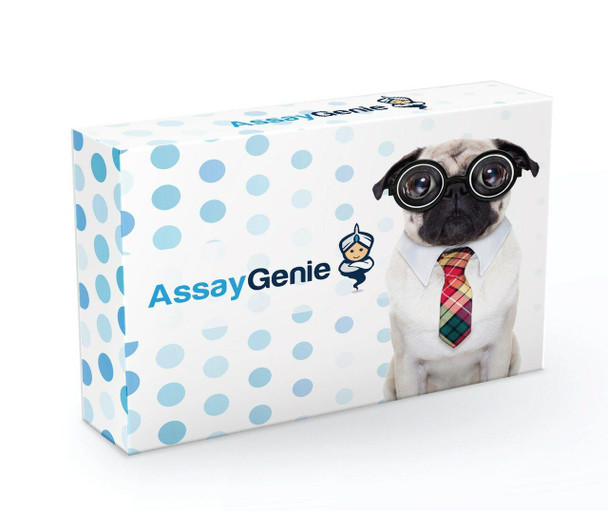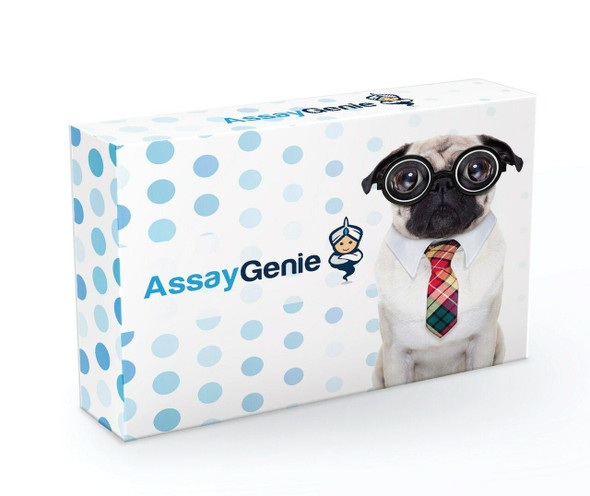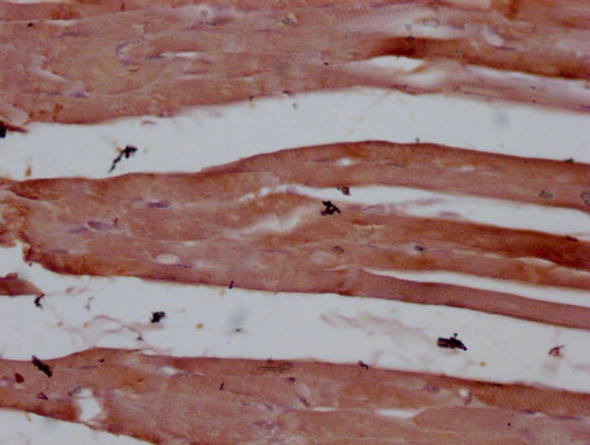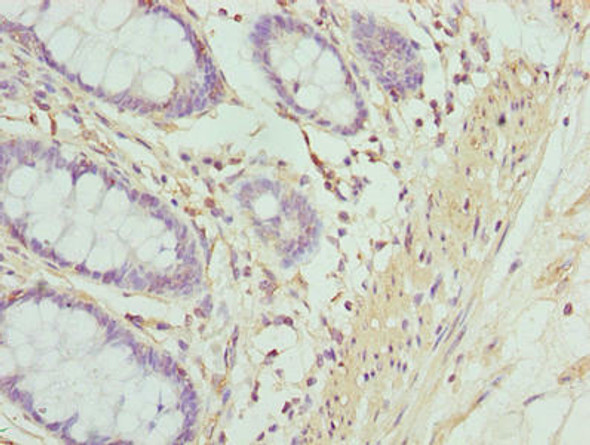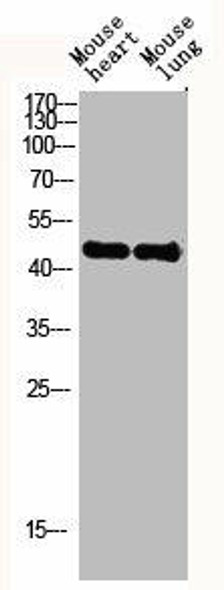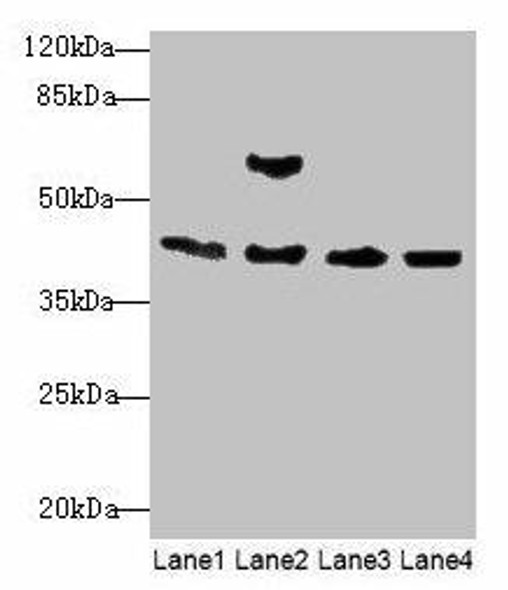Description
Phospho-ACTC1/ACTG1/ACTG2/ACTA1 (Y55/53) Antibody (PACO05187)
The Phospho-ACTC1/ACTG1/ACTG2/ACTA1 (Y55/53) Antibody (PACO05187) is a high-quality polyclonal antibody designed for research involving phosphorylation of actin proteins ACTC1, ACTG1, ACTG2, and ACTA1 at tyrosine residues 55 and 53. This antibody, raised in rabbits, is highly reactive with human samples and is validated for use in various applications, including Western blot and immunohistochemistry.The phosphorylation of actin proteins plays a crucial role in regulating cell motility, cytoskeletal dynamics, and cell signaling pathways. Phosphorylation at specific tyrosine residues, such as Y55 and Y53, has been implicated in various cellular processes, including cell migration, adhesion, and differentiation.
The Phospho-ACTC1/ACTG1/ACTG2/ACTA1 (Y55/53) Antibody enables detection and analysis of phosphorylated actin proteins in different cell types, making it an invaluable tool for studies in cell biology, cancer research, and developmental biology.Understanding the role of phosphorylated actin proteins in cellular processes is essential for unraveling the molecular mechanisms underlying various diseases, including cancer, cardiovascular diseases, and neurological disorders. The Phospho-ACTC1/ACTG1/ACTG2/ACTA1 (Y55/53) Antibody provides researchers
| Antibody Name: | Phospho-ACTC1/ACTG1/ACTG2/ACTA1 (Y55/53) Antibody (PACO05187) |
| Antibody SKU: | PACO05187 |
| Size: | 50ug |
| Host Species: | Rabbit |
| Tested Applications: | ELISA, IHC |
| Recommended Dilutions: | ELISA:1:5000, IHC:1:100-1:300 |
| Species Reactivity: | Human, Mouse, Rat |
| Immunogen: | Synthesized peptide derived from human Actin- α / γ around the phosphorylation site of Y55/53. |
| Form: | Liquid |
| Storage Buffer: | Liquid in PBS containing 50% glycerol, 0.5% BSA and 0.02% sodium azide. |
| Purification Method: | The antibody was affinity-purified from rabbit antiserum by affinity-chromatography using epitope-specific immunogen. |
| Clonality: | Polyclonal |
| Isotype: | IgG |
| Conjugate: | Non-conjugated |
| Synonyms: | ACTC1; ACTC; Actin; α cardiac muscle 1; α-cardiac actin; ACTG1; ACTB; ACTG; Actin, cytoplasmic 2; γ-actin; ACTG2; ACTA3; ACTL3; ACTSG; Actin, γ-enteric smooth muscle; α-actin-3; γ-2-actin; Smooth muscle γ-actin; |
| UniProt Protein Function: | ACTC1: Actins are highly conserved proteins that are involved in various types of cell motility and are ubiquitously expressed in all eukaryotic cells. Polymerization of globular actin (G-actin) leads to a structural filament (F-actin) in the form of a two-stranded helix. Each actin can bind to 4 others. Belongs to the actin family. |
| UniProt Protein Details: | Protein type:Cytoskeletal; Contractile; Cell development/differentiation; Motility/polarity/chemotaxis; Myosin-binding Chromosomal Location of Human Ortholog: 15q14 Cellular Component: actin filament; cytoplasm; cytosol; extracellular space; filopodium; focal adhesion; I band; lamellipodium; membrane; sarcomere Molecular Function:ATP binding; ATPase activity; myosin binding Biological Process: actin filament-based movement; actin-myosin filament sliding; actomyosin structure organization and biogenesis; apoptosis; cardiac muscle morphogensis; cardiac myofibril assembly; heart contraction; muscle filament sliding; muscle thin filament assembly Disease: Atrial Septal Defect 5; Cardiomyopathy, Dilated, 1r; Cardiomyopathy, Familial Hypertrophic, 11 |
| NCBI Summary: | Actins are highly conserved proteins that are involved in various types of cell motility. Polymerization of globular actin (G-actin) leads to a structural filament (F-actin) in the form of a two-stranded helix. Each actin can bind to four others. The protein encoded by this gene belongs to the actin family which is comprised of three main groups of actin isoforms, alpha, beta, and gamma. The alpha actins are found in muscle tissues and are a major constituent of the contractile apparatus. Defects in this gene have been associated with idiopathic dilated cardiomyopathy (IDC) and familial hypertrophic cardiomyopathy (FHC). [provided by RefSeq, Jul 2008] |
| UniProt Code: | P68032 |
| NCBI GenInfo Identifier: | 54036697 |
| NCBI Gene ID: | 70 |
| NCBI Accession: | P68032.1 |
| UniProt Secondary Accession: | P68032,P04270, |
| UniProt Related Accession: | P68032 |
| Molecular Weight: | 42,019 Da |
| NCBI Full Name: | Actin, alpha cardiac muscle 1 |
| NCBI Synonym Full Names: | actin, alpha, cardiac muscle 1 |
| NCBI Official Symbol: | ACTC1 |
| NCBI Official Synonym Symbols: | ACTC; ASD5; CMD1R; CMH11; LVNC4 |
| NCBI Protein Information: | actin, alpha cardiac muscle 1 |
| UniProt Protein Name: | Actin, alpha cardiac muscle 1 |
| UniProt Synonym Protein Names: | Alpha-cardiac actin |
| Protein Family: | Actin |
| UniProt Gene Name: | ACTC1 |
| UniProt Entry Name: | ACTC_HUMAN |

